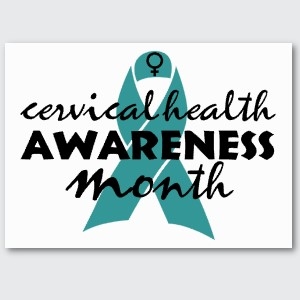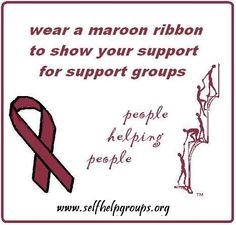Adopt A Rescued Bird Month on January, 2025: What are the normal fees for adopting a rescued cockatoo or other large parrot?
January, 2025 is Adopt A Rescued Bird Month 2025. Wildlife Adoption Center Adopt an Endangered Animal Today And Help Protect Wildlife Tomorrow
As an Amazon Associate I earn from qualifying purchases.
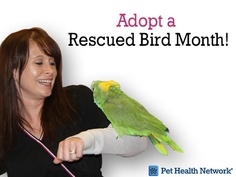
I run a rescue here in Michigan, and unless there is a great big vet bill or something, typically I don't charge a rehoming fee. But, I'm a nazi about making sure that the people who come to me learn everything they possibly can about their bird before it ever gets to their house.
My philosophy is this: If you want a big bird, you're going to get a big bird whether it's from me or someone else. So, rather than have you go out and just get one on your own, I'd rather give a good home to the ones that come here, and I do that by asking you to read, read, read, and then I quiz you on all you've learned. I do home checks, and then if all goes well, your bird is fostered into your care.
The foster time can range from 6 months to 18 months depending. If things are shaky at the 6 month home visit, then we can extend the foster period. If they're still shaky at a year, our choices are to take back the bird or to foster for an additional six months.
Once we're confident you're good on your own and you don't need our help anymore, then the bird is then adopted to you, with the stipulation that if it ever gets to the point where you must get rid of the bird or if something happens to you and you need to give it to someone else...the bird comes back to us. If you have a particular person in mind to take your bird, we'll begin the same process with the next person.
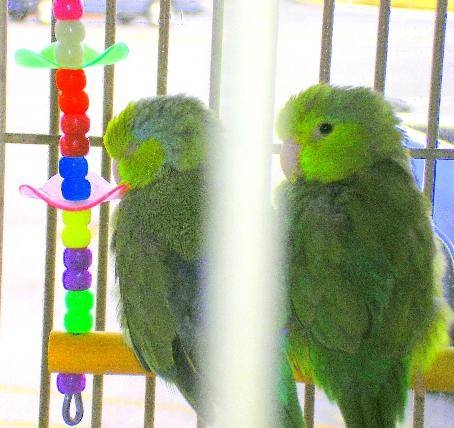
I need to adopt a bird for free, I can find one....?
Most places will not let you adopt a bird for free. Birds are somewhat expensive to care for, and by putting an adoption fee up for them, it ensures that the person adopting has sufficient funds to support the bird. If you have enough money to care for the bird then you have enough money to adopt one. If you can not afford to adopt one, then most likely you can not afford to properly care for it. I'm not sure why you would "need" to adopt one either. I could see you wanting to adopt one, but by using the word need it makes it sound fishy. If you really want to adopt a bird, there are many adoption agencies that will work with you. You will have to provide proof that you can financially take care of the bird, that you are educated enough with birds to care for it, and that your home is fit for a bird. If you meet all of these criteria, then most adoption agencies only ask a small fee, (for the bird size you are interested in probably a couple hundred dollars) so it shouldn't be a problem.
here are the requirements, which are similar for all good rescue sites, to adopt a bird......
Requirements
NO BREEDERS!
Prospective adopters must contribute up to 6 months of cleaning, feeding and interaction time with the bird they wish to adopt. Completion of this requirement does not mean that the adoption will be finalized.
There must be an obvious and clear relationship with the bird you wish to adopt. No bird will be given up unless the bird has decided that it likes you. Patience will be a big asset when striking up a relationship with an older bird that has had a less than perfect life. Repeat visits will be required.
Preference will be given to applicants who:
- Are more than 25 years old
- Own a home
- Have a steady employment history
- Have no cats or other dangerous pets
- Do not smoke
The home you provide an adopted bird must offer an improvement to the life it enjoys at Foster Parrots. The home that offers more interaction and love will have a much greater chance of adoption.
You must live in Massachusetts or within 2 - 3 hours drive of the Boston area.
NO TEFLON OR NON-STICK COOKWARE. See
There is a 2-year probation period during which, should improper care be given to the adopted bird, forfeiture of the bird will occur.
Improper care will be considered any of the following:
Any diet that does not include fresh foods on a daily basis.
Any diet that consists of a poor-quality seed mix (made up of predominantly sunflower/peanuts).
Any diet that contains dangerous or unhealthy items i.e. avocado, fried foods, sweets (donuts, chocolate, candy).
Neglect! The adopted bird should receive many hours of time outside of his/her cage. Birds left in cages for long periods of time, more than 8 hours a day, exclusive of nighttime caging, shall be considered to be neglected.
Lack of medical attention. Medical attention should be sought for any adopted bird with an avian specialist veterinarian as soon as any unusual symptoms or behavior is noticed.
Remember it is our job to find good homes for our birds, NOT to give cheap birds to anyone who asks. If you feel that you can meet these requirements and convince us that you will be a loving caretaker to a parrot in need of a special home, we would love to meet you.
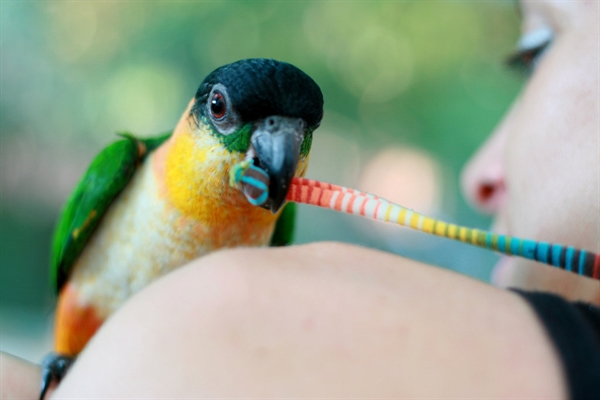
african grey bird help?
Their eyes change over time (the first 5 years) and this is really the only way you can be reasonably certain of the age, unless the bird is closed banded with the year and month of hatching.
GENERAL BREAKDOWN:
black eyes = under 4 months old
dark grey eyes = 4 to 6 months
grey eyes = 6 months to 4 years
slightly yellow eyes = 4 to 5 years
bright yellow eyes = 5+ years
The eyes change gradually over their first 5 years and the yellow colour deepens beyond that, but it's so subtle and varies from bird to bird so much that it isn't possible to be completely accurate without also having a closed band on the bird as well.
I have a TAG (Timneh) that's a full 5 years old and his eye are a very light yellow. I also have a CAG (Congo) that's 3 years old and is already showing some hint of yellow.
Only buy a parrot from a reputable breeder, or adopt from a parrot rescue. Avoid pet shops and online sellers.
Be sure to do your research on their care BEFORE you buy the bird, and get things all set up at home in advance. There is nothing so stressful on bird and human than to get both the bird and it's cage at the same time. Cage set ups can take many hours and you don't want your new friend to stress out watching you struggle with assembling its cage. "Coming home" day should be relaxing for you and a minimal stress day for your bird.
Join an African Grey forum (there are some very good ones) for the free information they make available and help from other Grey "fanciers." There's nothing quite like getting help from those who love and live with African Greys all day. :)










